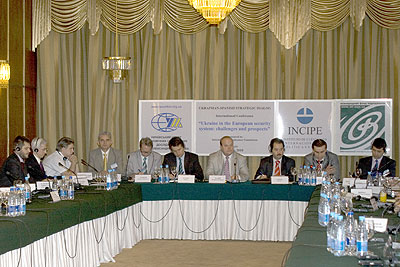II Spanish-Ukrainian Strategic Dialog: Ukraine in the European security system. Challenges and prospects

Kiev, June 8, 2010
The International Affairs and Foreign Policy Institute (INCIPE) and Razumkov Centre, organized, with the support and sponsorship of International Renaissance Foundation, an International Conference with the title: “Ukraine in the European Security System: problems and prospect”. The Conference took place in the “Hotel Kyiv” in Kyiv, on June 8th, 2010.
This Conference has been the last stage, for the moment, of the Ukrainian-Spanish strategic dialogue that was launched in November 2008 in Madrid, when the Institute for International Affairs and Foreign Policy (INCIPE) and Razumkov Centre, under the initiative of the Ukrainian Embassy in Spain and with the support of the MFA of Ukraine and the Ministry of Foreign Affairs and Cooperation of Spain, held the Seminary called “Ukraine, EU and NATO”.
The primary target of the Conference, which assembled an important group of experts and international analysts, was to analyze the problems and prospects for Ukraine in the European security system. In the inauguration of the Conference, the Director of the INCIPE Foundation, Prof. Vicente Garrido Rebolledo, emphasized that our dialogue has proved its importance and significance for bilateral relations between Ukraine and Spain, and set a good framework for discussion of current issues, such as cooperation and bilateral relations as well as other important European issues. Therefore, our Institute wishes to hold the next round of dialogue in Spain.
In the recent years there have been many changes, both in Europe and Ukraine, including the new vectors of Ukraine’s foreign policy that transformed relations between Kyiv and Moscow and continued talks between the EU and Ukraine on the Association Agreement and FTA. Therefore, it is very important for Spanish delegation to analyze the situation, to learn more about the position on European integration of Ukraine and its relations with the EU and NATO (here it is essential to remark that when speaking of Euro-Atlantic security, we should understand that the EU and NATO are not the same, they are two different things).
A new environment, a new security climate has been formed in Europe (especially after the signing of the Lisbon Treaty). The new NATO strategic concept has also been discussed. In this context, it is worth to mention that in the recent released NATO report, Ukraine and Georgia were mentioned in the same paragraph with identical guidelines and recommendations to both countries. It seems this is not very correct.
Two aspects should be emphasized here. The first one is the recent proposal to Ukraine, by the Russian President Dmitri Medvédev, regarding the new strategic relations between the two countries. Perhaps, this could represent Russian response towards the preparations of a new NATO Strategic Concept. The second aspect relates to the proclamations of non-aligned status of Ukraine. The question is how this status can go in line with the fact that NATO-Ukraine cooperation today is much more intense than with any other country-partner of Ukraine (particularly in defense sector). We may express different positions here, but still have a lot in common. The Spanish experience of European integration could possibly help the Ukrainian partners to gradually and consistently move in the European direction.
Negotiations, which Spain held with the EU to become a member of the European community, were very difficult and lengthy. After Franco’s rule, we had the transition from dictatorship to a democratic system, accompanied by many sacrifices on the Spanish side (particularly in the agricultural sector). In other words, EU integration represents a really long process that can take up to 10-15 years, and today it is difficult to predict how long it will take for Ukraine to join the EU.
This is not an easy task to accomplish. Moreover, all the steps have to be explained to the civil society, where the people often fail to understand that a country has to make certain sacrifices prior joining the EU in order to gain many benefits for society in the long-term. No doubt, Ukraine must take concrete and pragmatic steps in dealing with the EU. This includes the introduction of European standards, and solidarity with common EU security policy.
It is very obvious that we will continue to have discussions between our countries on various issues including European integration of Ukraine and the role of Spain in this process. We must consider this dialogue of a great importance in the context of future prospects for Ukraine’s integration into the EU.
The first panel was dedicated itself to the new approaches to strengthening stability and security in Europe. It was moderated by Dr. Valery Chalyi, Director General of the Razumkov Centre, and counted with the interventions of: Mr. Anatoliy Zlenko, Former Minister of Foreign Affairs of Ukraine; Mr. Manuel Acerete, Deputy Director-General for Security, Ministry of Foreign Affairs and Cooperacion, Spain; Mr. Oleksandr Lytvynenko, Deputy Director, National Institute for Strategic Studies.
The second panel was focused in analyzing “Rusia-Ukraine-NATO/UE triangle relations. It was moderated by Prof. Vicente Garrido Rebolledo, Director of the INCIPE Foundation and counted with the participations of: Mr. Olexander Chalyi, Ambassador Extraordinary and Plenipotentiary of Ukraine; Lieutenant Commander Francisco Ruíz, Analist at the Spanish Institute for the Strategic Studies (IEEE), Ministry of Defence; Mr. Yuri Scherbak, Ambassador Extraordinary and Plenipotentiary of Ukraine.
The last panel was moderated by Mrs. Ivanna Klympush-Tsintsadze, Director of Arseniy Yatsenyuk’s “Open Ukraine Foundation” and the participants were: Mr. Jose Manuel Pinto Teixeira, Ambassador, Head of EU Delegation to Ukraine; Mr. Yevgen Perelygin, Head of the European Integration Bureau; Mr. Borys Tarasyuk, Chairman of the Verthovna Rada of Ukraine Committee on European Integration. The main subject was The Prospects for EU-Ukraine cooperation.
The meeting was attended by Ministries of Foreign Affairs and Defence Ministries, Diplomats, Academic, Journalists and experts in general.

